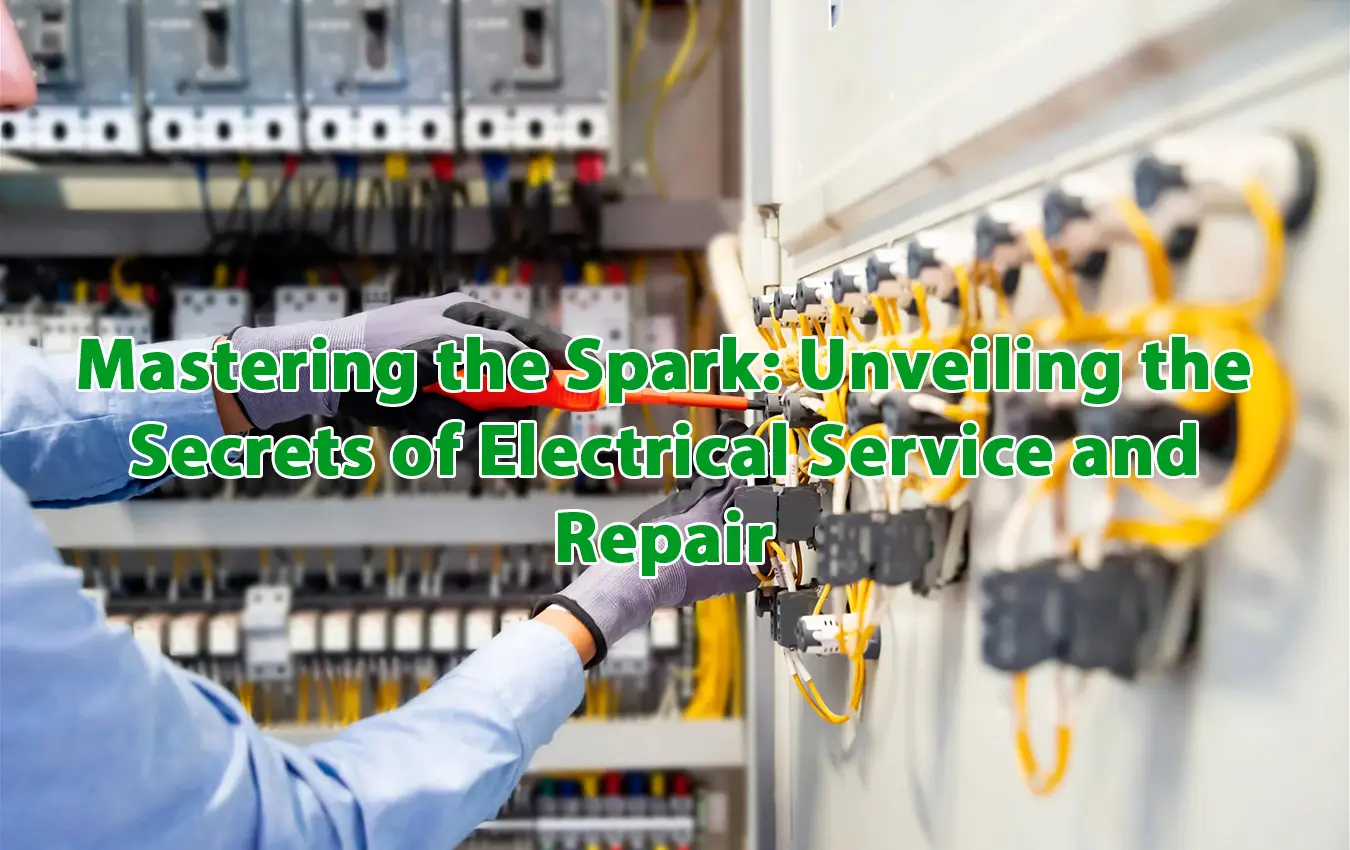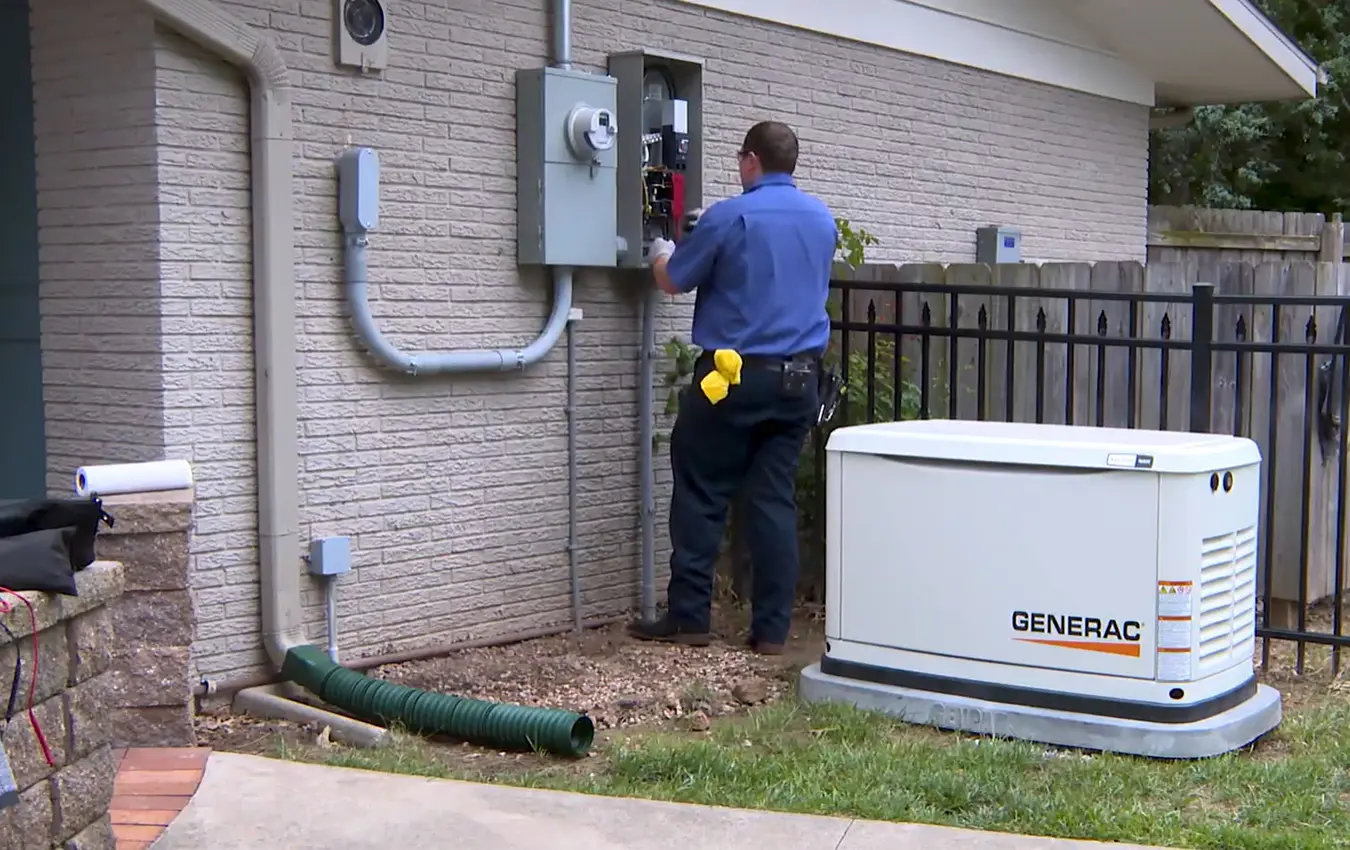Understanding the Basics of Electrical Service and Repair
Electricity powers our homes and businesses, offering comfort and convenience. But it can also pose risks if mishandled. This blog post aims to give you a basic understanding of electrical service, repair, and safety measures.
We’ll delve into understanding electrical systems, fixing common issues, deciding between DIY and professional repairs, implementing safety measures, enhancing energy efficiency, troubleshooting common problems, hiring a professional electrician, and answering frequently asked questions. Keep reading!
Warning! Repairing electrical issues on your own can be very dangerous. You can cause more damage to your electrical system or your appliances or devices. You can also expose yourself to shocks, burns, fires, or even death. Therefore, you should always call for a professional electrical repair service unless you are just changing a light bulb. They have the qualifications, certifications, licenses, tools, equipment, and insurance to handle any electrical service and repair tasks safely and correctly.
Premier Electrical Services will provide fast, quality repairs to faulty electrical wiring, sockets, etc. Call us at 954-900-1696 today and tell us what electrical problem is bothering you!
Understanding Electrical Systems
Electricity is the flow of electrons through a conductor, measured in amps (current). The force pushing the electrons is voltage. Resistance measures opposition to this flow. Ohm’s law states that voltage equals current times resistance (V=IR).
Electrical systems use electricity for specific tasks and can be either alternating current (AC) or direct current (DC). AC powers household appliances and comes from the power grid. DC, with a constant voltage, powers devices like laptops and comes from batteries or solar panels.
Critical components of an electrical system include wires, switches, outlets, circuit breakers, fuses, and transformers. Wires carry electricity; switches regulate its flow; outlets provide plug-in points; circuit breakers and fuses protect against overloads; transformers alter voltage levels.
Understanding these concepts and components is crucial for effective electrical service and repair.
Electrical Safety Measures
Electricity can be dangerous if not handled correctly, so follow these simple safety steps:
Turn off the power before starting any electrical work. Use a voltage tester or multimeter to ensure no electricity is in wires or components.
Wear protective gear like gloves, goggles, boots and coveralls. Avoid jewelry or metal items that could conduct electricity.
Use insulated tools designed for electrical work and avoid damaged ones.
Follow manufacturers’ instructions for electrical components. Don’t use incompatible devices with your system.
Keep kids and pets away from your electrical workspace. Don’t leave exposed wires or components unattended.
Regularly inspect your electrical system for wear or damage. Repair or replace any damaged parts like wires, switches, outlets, etc.
If you’re unsure about an electrical task, consult a professional. Don’t risk tackling tasks beyond your skill level.
Common Electrical Issues and How to Fix Them
Now that you have a basic understanding of electrical systems and their components, let’s look at some common electrical issues you may encounter in your home or business and how to fix them.
Circuit Breaker Trips
Circuit breaker trips are usually due to overloading, short circuits, or ground faults.
To fix this:
- Turn off all devices connected to the affected circuit.
- Find your electrical panel and the tripped breaker (usually in the middle or off position).
- Reset the breaker by flipping it off and then on.
- Turn on one device at a time to identify the problem source. If needed, unplug, repair, or replace it.
If the breaker keeps tripping without a clear cause, seek professional help.
Flickering Lights
Flickering or dimming lights can be an annoyance and a potential safety hazard. The cause can be loose connections, faulty bulbs, or voltage fluctuations.
To resolve this:
- Check your light bulbs and replace any that are burned out, damaged, or incompatible.
- Tighten any loose screws or wires on your light switches, outlets, and fixtures. Replace any that are broken or worn out.
- Look for signs of damage in your wiring. Repair or replace them as needed.
- Reduce the load on your electrical system by unplugging unnecessary appliances or devices.
If these steps don’t work, contact your utility company — the issue might be due to external factors.
Faulty Outlets
Faulty outlets are dangerous. Loose connections, damaged outlets, or faulty wiring might cause them.
To fix them:
- Turn off the power to the affected outlet from your circuit breaker.
- Use a voltage tester or multimeter to ensure the outlet isn’t live.
- Remove the outlet’s cover plate without touching any wires inside the box.
- Tighten loose connections with a screwdriver or pliers, or splice them using wire nuts or solder.
- If the outlet is damaged, replace it with a new one that fits your electrical system.
- Reattach the cover plate and restore power.
- Test the outlet again using your voltage tester or multimeter.
If this doesn’t work, you may need professional help from your local electrical services.
DIY vs. Professional Electrical Repairs
When faced with electrical problems, deciding whether to do-it-yourself or hire a professional depends on the task’s complexity and your skills.
Simple tasks like replacing light bulbs, switches, or outlets can be done yourself with the right tools and guidance. However, complex tasks involving high voltage or detailed wiring, such as working on your electrical panel or wiring system, should be left to professionals.
Safety is crucial in electrical repairs. Mishandling electricity can lead to shocks, fires, or even fatalities. Incorrect methods can damage your system or appliances and violate local regulations, leading to penalties.
So, for tasks beyond your capabilities, hiring a professional electrician is advisable. They have the qualifications, tools, and insurance to perform tasks safely and correctly, saving you time, money, and ensuring your safety.
Energy Efficiency in Electrical Systems
Mastering electrical service and repair can help optimize energy consumption, lower electricity bills, and benefit the environment. Here’s how you can enhance the energy efficiency of your electrical systems:
Swap incandescent light bulbs with LED or CFL bulbs. They’re more energy-efficient, last longer, produce less heat, and provide better lighting.
Use dimmer switches or motion sensors for lighting. They allow you to adjust brightness and automatically switch off lights when not required, saving energy and extending bulb life.
Employ power strips or surge protectors for your appliances. They enable you to manage multiple devices’ power supply with one switch, preventing phantom loads or standby power used by devices even when switched off or in sleep mode.
Upgrade to energy-efficient appliances or devices bearing the Energy Star label. These products meet government standards for energy efficiency, use less energy, and perform better than conventional ones.
Regularly inspect and maintain your electrical system. Look for damage or wear on wires, switches, outlets, fixtures, fuses, breakers, transformers, and repair or replace them to prevent any issues affecting energy efficiency or safety.
By implementing these tips, you can reduce your electricity bills and carbon footprint.
Common Electrical Problems and Troubleshooting Tips
In this section, we will discuss some common electrical problems you may face in your home or business and how to troubleshoot them.
Circuit Overload
A circuit overload happens when too many devices or appliances exceed a circuit’s capacity, resulting in a tripped circuit breaker or blown fuse. To troubleshoot this issue, turn off all devices on the overloaded circuit. Locate and reset the tripped breaker or replace a blown fuse. Switch on each device to find the overload source. If no device trips the breaker again, the overload is temporary.
To prevent circuit overloads:
- Don’t plug too many devices into the same circuit. Use power strips or surge protectors to share the load across different circuits.
- Avoid using high-wattage devices on low-capacity circuits. Verify your devices’ wattage against your circuits’ ratings.
- Limit the use of extension cords or adapters that can increase circuit load. Use them sparingly and for short durations only.
Faulty Wiring
Faulty wiring is a problem with the wires hidden behind your walls, ceilings, or floors. Issues like frayed, exposed, or shorted wires fall under this category. Such wiring problems pose a fire risk and lead to various electrical disturbances like flickering lights, malfunctioning outlets, and power outages.
Faulty wiring is a serious issue that professional electricians should handle. Diagnosing and repairing electrical problems requires specialized knowledge and skills to ensure safety and effectiveness.
To prevent faulty wiring:
- Don’t overload, short circuit, or ground your wires incorrectly. Use wires with the correct size, type, and insulation.
- Prevent wire damage by avoiding cutting, nailing, stapling, or bending them. Use the right tools and methods while installing, repairing, or replacing wires.
- Keep wires away from moisture, heat, and chemicals. Ensure appropriate protection and ventilation for your wires.
- For complex or large-scale wiring projects, hire a professional electrician. Don’t take on tasks beyond your abilities. Always keep in touch with your electrical services 911.
Power Outage
A power outage, the total loss of electricity in your home or business, can be triggered by weather, accidents, equipment failures, or maintenance work. It can impact your safety, comfort, and productivity.
To fix a power outage, check if the outage only affects you or the entire neighborhood. If it’s just your property, check for tripped breakers or blown fuses in your electrical panel. Reset or replace as needed. If the outage is widespread, report it to your utility company. Use a backup generator or battery system for essential appliances until power is restored.
To prevent power outages:
- Use surge protectors or uninterruptible power supplies (UPS) for devices sensitive to voltage changes or power interruptions. These can protect your devices from damage and provide temporary power during an outage.
- Regularly maintain and upgrade your electrical system. Inspect wires, switches, outlets, fixtures, fuses, breakers, and transformers for damage or wear. Repair or replace them as necessary.
- Prepare an emergency kit with flashlights, batteries, candles, matches, radios, phones, and chargers. Store it in an easily accessible location and check it periodically for expired items and functionality.
Hiring a Professional Electrician
You can handle minor electrical tasks, but you need a professional electrician when it comes to high voltage, complex wiring, or specialized equipment. This includes jobs like installing or repairing your electrical panel, wiring system, transformer, generator, lighting system, security system, smart home system, solar panel system, and any electrical components requiring permits, inspections, or certifications.
Hiring a professional electrician ensures safety as they are trained to handle electrical tasks safely and correctly, adhering to local codes and regulations. They also provide quality work using the right tools and top-quality materials, offering warranties. Plus, they offer the convenience of completing tasks quickly with minimal disruption.
To hire a professional electrician, research and find a reputable one in your area, request and compare quotes, negotiate contract terms, and review the completed work. Remember to ask about their qualifications, certifications, licenses, and insurance.
Premier Electrical Services — the best electrical service and repair in Boca Raton! We are ready to help at any moment! Call us at 954-900-1696
Electrical Service and Repair Tips
Here’s how to keep your electrical system running smoothly and prevent future issues:
Regularly inspect your electrical system for damage or wear. Look at wires, switches, outlets, fixtures, fuses, breakers, transformers, and replace or repair as necessary.
Periodically test outlets with a voltage tester or multimeter to ensure they function correctly and provide the right voltage.
Occasionally clean outlets with a dry cloth or vacuum to remove dust or debris, preventing poor contact or sparks.
Label circuit breakers or fuses in your electrical panel to identify which circuit controls what.
Keep a log of your electrical service and repair history to track changes or issues in your system.
Always hire a professional for complex or significant electrical issues beyond your capabilities.
Frequently Asked Questions (FAQs)
Q: How can I identify an electrical problem?
A: Signs of an electrical issue include flickering or dimming lights, faulty outlets, frequent circuit breaker trips or fuse blows, a burning smell or smoke, sparks or shocks, buzzing sounds, or unusually high electricity bills. If you encounter these, inspect your electrical system ASAP.
Q: What steps can I take to prevent an electrical fire?
A: To avoid an electrical fire, refrain from overloading, short-circuiting, or grounding your wires, and avoid damaging them. Keep wires away from moisture, heat, or chemicals. Use surge protectors for sensitive appliances, install smoke detectors and fire extinguishers, and hire a professional for complex repairs.
Q: How can I reduce my electricity bills?
A: To save on electricity, switch incandescent light bulbs with LED or CFL bulbs, install dimmer switches or motion sensors, use power strips or surge protectors, upgrade to energy-efficient appliances, regularly maintain your electrical system, and optimize your energy consumption.
Conclusion
Well, now you are savvy enough to do electrical repairs at home. You are also aware of safety measures — please always follow them. Remember, changing a light bulb and switching a circuit breaker is not so difficult; however, it is better to entrust problems with wiring and outlets to professionals.
Keep your home safe! Entrust electric issues Premier Electrical Services. Call us now: 954-900-1696
Check out the latest news:
- 10 Electrical Hazards of DIY Generator Installation
- Transform Your Living Space: The Benefits of Home Theater Systems
- How to Choose the Right Lighting Fixtures for Your Home or Business
- Don’t Be Left in the Dark: Why Homeowners Should Consider Premier Electrical Services for Backup Generator Installation
- Residential Electrical Wiring: Why You Need a Professional Electrician






